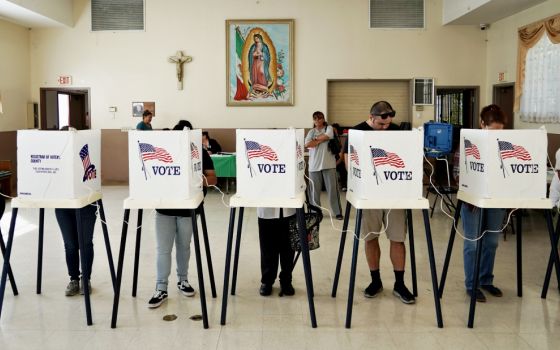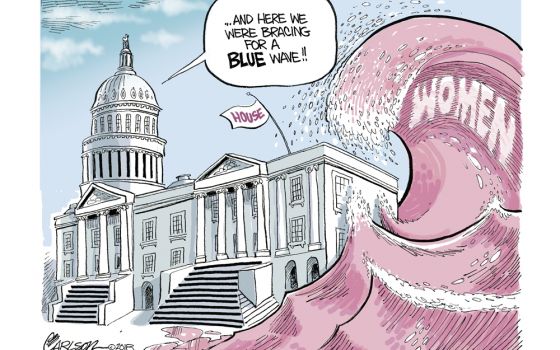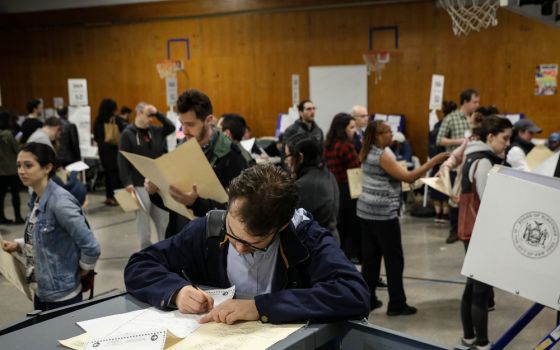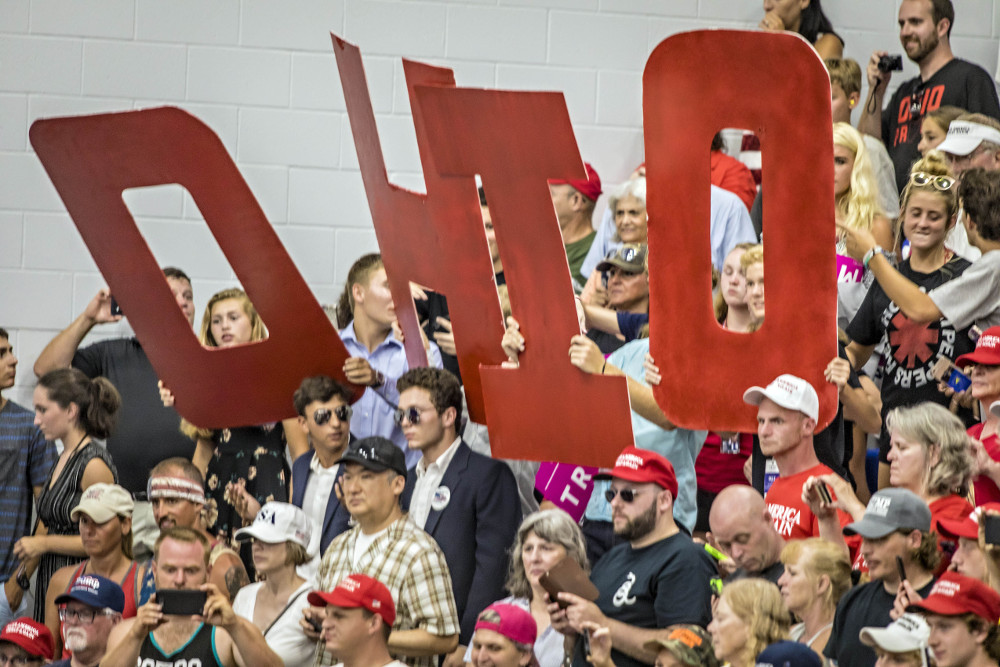
People in the crowd of a "Make America Great Again" rally hold up large O-H-I-O letters Aug. 4 in Lewis Center, just outside Columbus, Ohio. (Newscom/ZUMA Press/James D. DeCamp)
The red brick Georgians in the Columbus suburb of New Albany echo the classical architecture — albeit on a more modest scale — of the nearby 60,000-square-foot mansion owned by billionaire Leslie "Les" Wexner, co-founder of the real estate company behind this upscale master-planned community.
Lined with white fences, New Albany has an equestrian feel, although actual horses are rare, especially now that the city's annual riding and jumping competition has been canceled. Residents put up with rules about such things as mailbox color and basketball hoops in exchange for living in "America's No. 1 suburb," as determined by Business Insider in 2015.
The school district is among the best in the state, average home price sits at just under half a million dollars, and the median annual income of roughly $190,000 places New Albany among the dozen wealthiest places in Ohio. The Wexner mansion is halfway between two golf courses. One is private; the other, the New Albany Country Club, features a 27-hole golf course designed by Jack Nicklaus, three restaurants and private wine lockers for members.
Although it may sound like a breeding ground for Republicans, New Albany is home to a sizeable number of swing voters — many of them Jewish, but also Catholics, who cross party lines depending on the election and the issues. Those voters will likely determine the winner of a dead-heat midterm congressional race that observers see as a possible predictor of the 2020 presidential election.
Ohio's 12th district was tagged as "flippable" by national Democrats, despite its nine-term Republican representative having won handily with double-digit leads over his Democratic opponents. Although voters in the district chose Barack Obama in 2008, redistricting in 2011, which eliminated black neighborhoods in Columbus from the district, has strengthened GOP majorities in the now predominantly rural and suburban district.
But after Rep. Pat Tiberi (a Catholic) resigned in January, the August special election to replace him was too close to call for almost three weeks. Republican Troy Balderson eventually squeaked by with a victory over Democrat Danny O'Connor by a margin of less than 1 percent of the vote.
The only one of seven counties in the district to go blue in that special election was Franklin County, home of New Albany. And New Albany residents delivered a win for O'Connor in all six of its precincts.
Now, the general election pits the same two candidates against each other, and the close race means swing voters will be key. Catholics voters seem split between anti-Trumpers and pro-lifers, with both groups saying their candidate matches their Catholic values.
Pat Sweeney of New Albany, a 65-year-old retired ER doctor, mother of three grown children and staunch Catholic, considers herself conservative, but she voted for O'Connor in the special election and will do so again in November.
"I don't vote Republican anymore," she said. In fact, Sweeney may vote a straight Democratic ticket this midterm election, because she views the GOP as "amoral" for standing behind President Donald Trump.
"Trump is the worst thing that has happened to this country," said Sweeney, who thought he was a "creep" when he was elected, but hoped that he would surround himself with good people. "That didn't happen," she said.
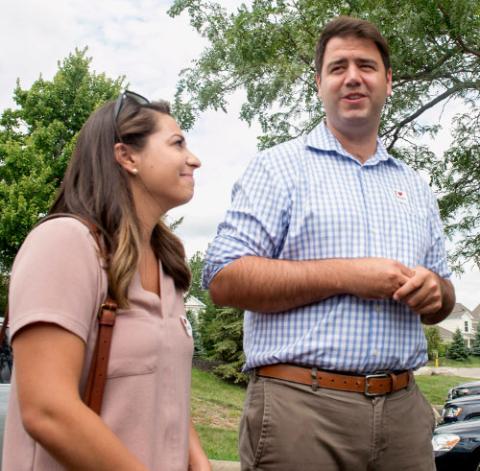
Ohio Democratic congressional candidate Danny O'Connor, with his fiancée, Spenser Stafford (Newscom/ZUMA Press/Brian Cahn)
Still, she describes herself as socially and politically conservative: She believes "virtue" is important and is against "just throwing money" at social problems. She voted for both Bushes, and her favorite political columnist is David Brooks, a conservative who also has been critical of Trump.
Sweeney's Catholic faith is even stronger than her dedication to Ohio State, almost a local religion in the Columbus area.
"Everything is connected to my faith," explained Sweeney, the product of 12 years of Catholic education in her native Toledo and a member of New Albany's Church of the Resurrection. "It's the core of everything."
Sweeney started moving away from the GOP "when it started getting mean about gay people," and as she began to see other issues, in addition to abortion, as being "pro-life": the environment, health care, capital punishment, among others. She voted for Barack Obama, whom she believes "brought hope to many people who didn't have hope."
In the past, the abortion issue kept her from voting for some Democrats, but she has come to believe that making abortion illegal isn't the only way to be pro-life. And Trump, who used to be pro-choice, "is only anti-abortion because it's politically expedient," she believes.
Single-issue voters
But for every Ohio Catholic voter like Sweeney, there may be one for whom abortion is the only, or at least the primary, issue.
Kate Yonkura of Delaware shares much in common with Sweeney: She is a mom, although to younger children, and her Catholic faith is central to her life. She also lives in a wealthy, predominantly white suburb. Both women cite the church's teaching on the dignity of every human life as undergirding their political choices.
But for Yonkura, making abortion illegal is essential. "I'm a pro-life Catholic voter. That's my top issue for voting — always has been," said Yonkura, who belongs to St. Mary Parish in the burgeoning northern Columbus suburb of Delaware. "I believe every life is a precious creation, and that God meant for his children to be born and to have an opportunity to know him and to know Christ."
Although Balderson was not her choice in the primary, his track record on abortion earned Yonkura's support in the August special election and in the upcoming November one. As a state senator, Balderson voted for statewide bills that require abortion providers to bury or cremate fetal remains and that prohibit abortion after a Down syndrome diagnosis.
Balderson's association with Trump, who traveled to Ohio this summer to stump for him, has not swayed Yonkura from supporting the Ohio Republican, although she admits she would prefer a president whose personal life better matched the Midwestern family values she holds dear. "You choose the person who is as close to your values as you can," she said. "It's not always a perfect science."
She explains her ability to support Trump by noting that because he had been such a public figure, "you knew what you were getting," she said. "It didn't feel like the same standards would apply."
Yonkura and her husband have both worked as advisers for Republican politicians, but she would be open to an anti-abortion Democratic candidate, especially if they supported issues that affect children. "But that's not a combination you see much," she said.
The Yonkuras take in foster babies, most of whom have been separated from their biological parents because of drugs, including opioids. She supports expanded drug treatment options, but wasn't sure of Balderson's position on that issue.
Balderson has said he does not support Medicaid expansion, which would increase drug treatment options in Ohio. But he praised "faith-based" treatment options, saying that getting off drugs "is a spiritual journey also."
At a Saturday morning appearance Sept. 15 at a Republican headquarters in a suburban shopping mall, Balderson reminds volunteers how tight the race is. The crowd includes a sizeable number of young people.
His brief speech avoids issues, but he is quick to tell a reporter that he has always been pro-life. "I believe in the sanctity of life. That's what it's all about," said Balderson, who is Christian and has served as an elder at his church.
Advertisement
For 48-year-old Mark Weiner, Balderson's pro-life and "family values" credentials are why he has been canvassing, putting up signs and volunteering at parades for his campaign.
"He believes in what we believe in," said Weiner, a member of Church of the Ascension in Johnstown, a village of fewer than 5,000 people in Licking County. He cites "protecting the rights of the unborn" and "keeping our community safe by enacting tough laws" as examples of their shared values.
Weiner has attended two Trump rallies and accompanied the first lady on a tour of a local hospital this summer. In fact, he has lost respect for Ohio's more moderate Republican governor, John Kasich, after he did not show up at the latest Trump appearance.
Trump is "fighting for those same values as us," he said.
Other Catholic pro-life voters may find Trump distasteful but they hold their noses in the hopes of Supreme Court appointments that will lead to the overturning of Roe v. Wade. "I don't know if that's going to happen," admitted Lauren Manson, 34, who attends St. Matthew Parish in Gahanna, just south of New Albany. "But it's definitely not going to happen if we have a president who is pro-abortion."
Manson said she would not vote for a Republican candidate who supports abortion rights, but she can't see herself voting Democratic either, since she agrees with conservative candidates on other issues.
But she wonders if some conservatives might be open to Democratic candidates if they were more pro-life. "For a lot of people, abortion is a deal-breaker," Manson said.
'50-50 land'
Catholics like Sweeney and Yonkura represent not only different political choices, but two different views of Catholic identity, argues Steven Millies, author of Good Intentions: A History of Catholic Voters' Road from Roe to Trump.
As immigrants and outsiders, American Catholics have historically defined their identity as distinct from the prevailing Protestantism, that is, until the second half of the 20th century, according to Millies, associate professor of public theology and director of the Bernardin Center at Catholic Theological Union in Chicago.
Today, some Catholics have assimilated, while others have resisted assimilation with certain Catholic markers, such as opposition to abortion. "Distinctiveness is their preoccupation, not harmony. Where others seek to build a bridge to American life, these American Catholics seek to confront and disrupt those things in American life that do not correspond closely to church teachings," he writes.
"Both groups are made up of people who are intensely patriotic, devoted to being good Americans," Millies writes. "Both are committed to their Catholic faith, one group emphasizing demands of faith that distinguish Catholics from the American mainstream while the other emphasizes how a Catholic perspective interacts and harmonizes with mainstream, American life."
Despite these differences, what many Catholic voters share is a sense of "political homelessness" or not fitting in perfectly with either party, said Jerry Freewalt, director of the Office for Social Concerns for the Columbus Diocese.
Catholic voters in Columbus care about pro-life issues, he said, but they also are looking at immigration, the environment, health care and the opioid crisis. But it depends on who you ask and where you ask, Freewalt said, noting that urban voters are concerned about gun violence, while rural Catholics are more likely to want to protect gun rights.
"This is 50-50 land," he said, noting the nearly evenly split political division in Ohio that is mirrored in the country as a whole.
"You choose the person who is as close to your values as you can. It's not always a perfect science."
— Kate Yonkura
The 12th District has not been 50-50 in the past. Registered Republicans outnumber Democrats 2-to-1 there, and voters elected Trump by 11 percentage points in 2016.
But the polling averages on O'Connor and Balderson show them in a dead heat. Other statewide races are equally close, with a recent poll finding Democrat Sherrod Brown leading for U.S. Senate but Republican Mike DeWine ahead for governor. For both races, a fifth of voters were still undecided as of September.
Freewalt urges Catholic voters to educate themselves on the candidates and the issues. While he recognizes that not all issues have the same moral weight, Freewalt said some Catholics are not completely educated on the scope of Catholic teaching on issues facing them at the ballot box.
Catholics "have a moral responsibility to not just walk into the election booth and blindly press the buttons," he said. "You have to have spent some time in prayer, reflection and discernment about what our faith says about these issues," he said.
Along with the Catholic Conference of Ohio, the diocese provides resources to parishes to try to help them form their consciences before voting. One available bulletin insert is about civility and dialogue.
Freewalt thinks Catholics' frustration with the lack of civil political discourse may influence undecideds and swing voters. "I think a lot of people have had enough," he said. "That may be the issue that can sway their vote."
Never Trumpers
That's exactly what O'Connor supporter Cathi Kulik of Westerville is seeing, as voters she meets while canvassing — even in Republican strongholds — say they're voting Democratic. "Obviously, they're unhappy with the way things are going," she said.
Kulik, a 63-year-old retired elementary school teacher, jumped ship from the GOP decades ago, first identifying as an independent, but now as a Democrat. "I think the Republicans changed more than I did," said Kulik, who attends Mass at the St. Thomas More Newman Center at the Ohio State University.
She loved John McCain, and would have voted for him "if he had been running against anyone but Barack Obama." And both Bushes are "wonderful people."
But the current president? "I have bad feelings about him," she said. "I don't trust him."
Kulik supports O'Connor in part because of his stand on health care and gun violence. Abortion is not at the top of her list of priorities. "I've never met anybody who thought abortion is a good idea," she said. "But I think it should be up to an individual woman to make the choice. I don't know everyone's circumstances."
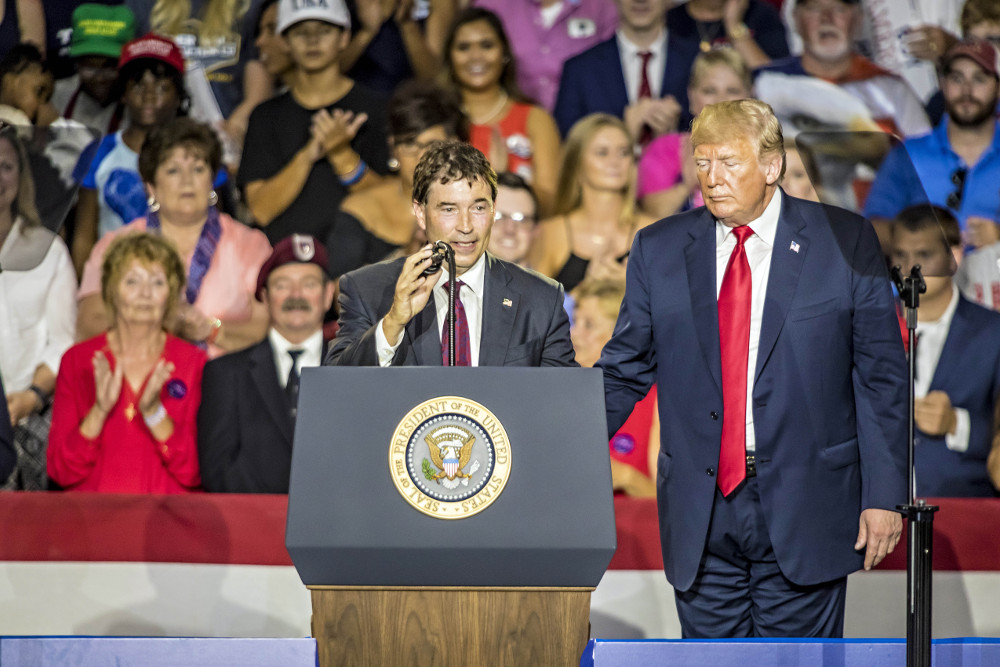
Republican Troy Balderson speaks at a rally as President Donald Trump looks on in Lewis Center, Ohio, Aug. 4. (Newscom/ZUMA Press/James D. DeCamp)
O'Connor supporter Sarah Mattick agrees that abortion should be legal, especially given the lack of social programs to support pregnant women. The Ohio Wesleyan University senior names women's rights as important in her decision to vote Democratic in the 12th District race.
Mattick's view of government is inspired by her Catholicism, Jesus and the Beatitudes. "There is no denying that Jesus kept the company of some of the most detested people in his community," she said to NCR in an email interview. "I believe that the government should work to help those who are hated, disdained, and are most vulnerable in a society, whether it be sex-workers, queer people or children."
Kulik sees herself as a "Matthew 25" Catholic. "I feel very strongly that we are put here to take care of folks that are vulnerable or less fortunate than ourselves," she said.
That's why she connected with O'Connor, whom she sees as sharing her values. "When I met Danny, I felt this is really somebody I could trust to speak for me," she said.
O'Connor credits his parents and Catholic faith for teaching him the value of service and helping the less fortunate. After college, he spent a year in the Jesuit Volunteer Corps, helping homeless and poor people in the Bronx, New York.
"Everyone is made in the image of God and needs to be treated with dignity and respect," O'Connor told NCR, in an interview peppered with references to papal encyclicals and quotes from saints. "I see [Catholicism] as a force that can do good in the world."
When others in his generation are leaving institutional religion, the 31-year-old O'Connor has inspired at least one convert to the faith: his fiancée. Their May 2019 wedding will follow her reception into the church at Easter.
Having also converted his GOP bride-to-be to vote Democratic — at least in this election —O'Connor will need to swing other voters to cross party lines or inspire those who wouldn't normally vote in midterm elections.
The 12th District's most famous swing voter is Wexner, founder chairman and CEO of L Brands (which includes Victoria's Secret and Bath & Body Works) and the man behind New Albany. In September, Wexner renounced his affiliation with the Republican Party.
Fellow New Albany resident Sweeney said she is seeing the same thing among her friends, including most, if not all, of the women in her Monday morning rosary group.
"We're all conservative. We worked our butts off to try to live in this nice place," she said. "But many people I know have gone from being registered Republicans to at least independents."
Is there anything the GOP could do to get her back? "Get rid of Trump," she said.
[Heidi Schlumpf is NCR national correspondent. Her email address is hschlumpf@ncronline.org.]








